AI Development in the Past Twenty Years
VerifiedAdded on 2023/06/10
|10
|3397
|265
AI Summary
This essay explores the history of AI development in the past twenty years, including top companies and projects related to AI. It discusses the positive and negative effects of AI on society, including its impact on healthcare, agriculture, climate change, and work efficiency. It also examines the potential risks of AI and its impact on human civilization.
Contribute Materials
Your contribution can guide someone’s learning journey. Share your
documents today.
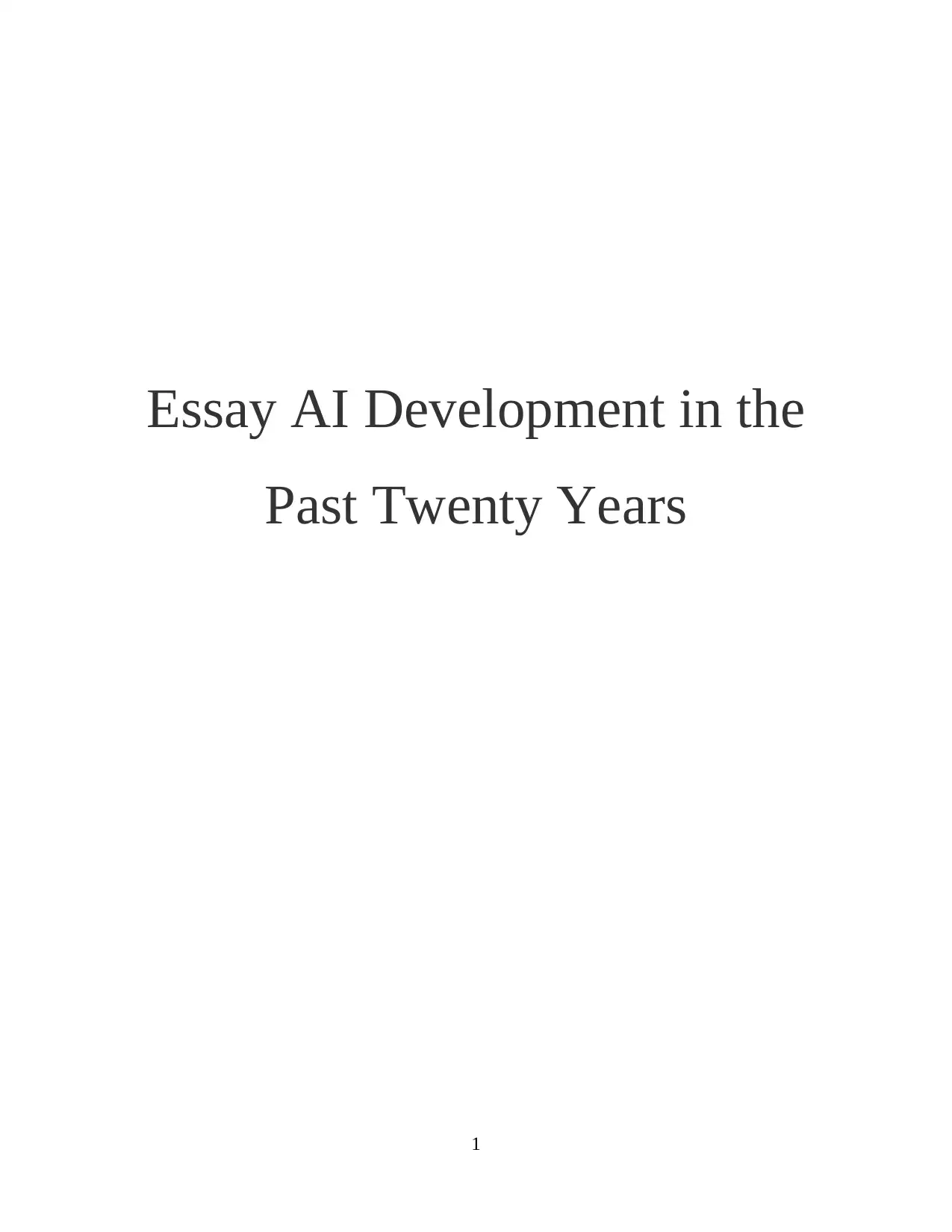
Essay AI Development in the
Past Twenty Years
1
Past Twenty Years
1
Secure Best Marks with AI Grader
Need help grading? Try our AI Grader for instant feedback on your assignments.
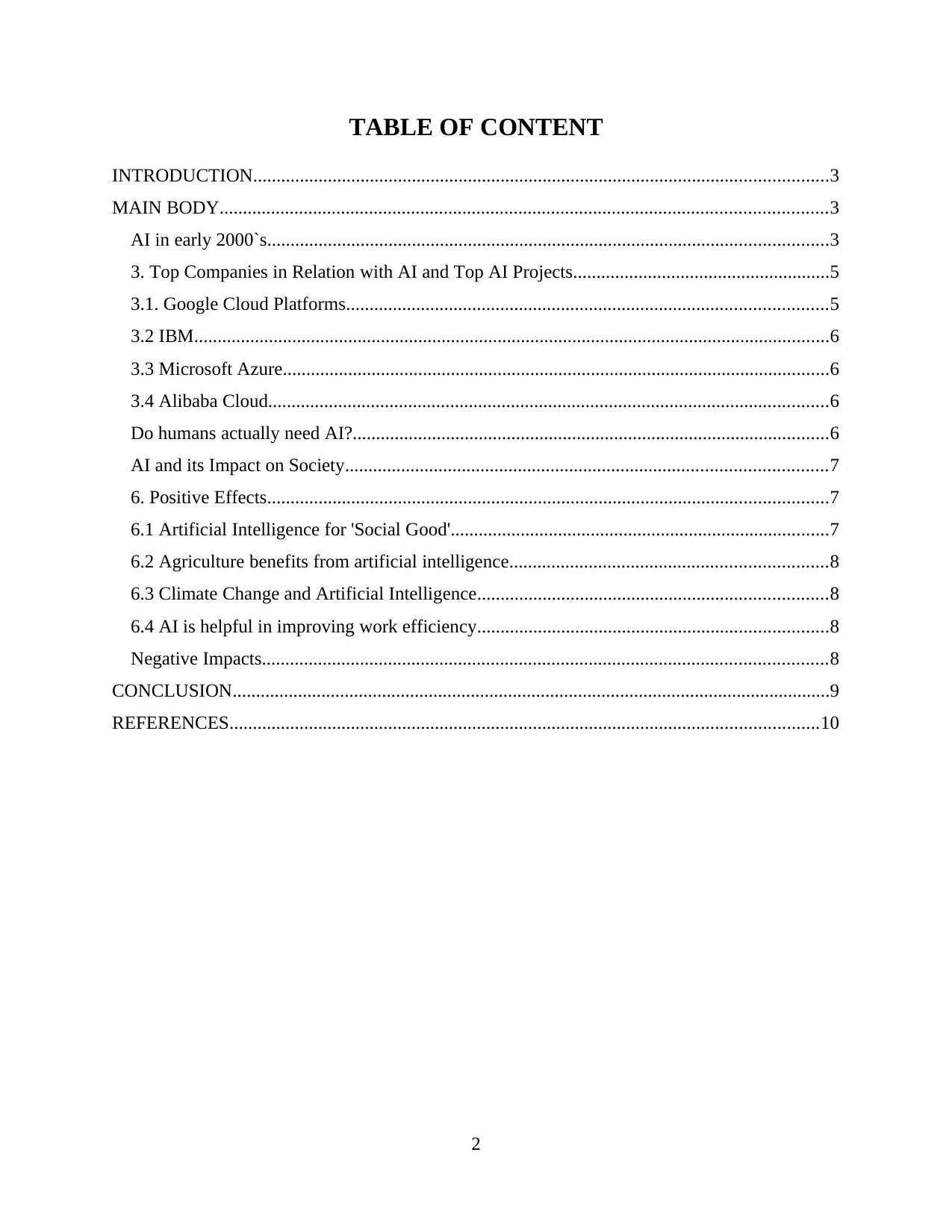
TABLE OF CONTENT
INTRODUCTION...........................................................................................................................3
MAIN BODY..................................................................................................................................3
AI in early 2000`s........................................................................................................................3
3. Top Companies in Relation with AI and Top AI Projects.......................................................5
3.1. Google Cloud Platforms.......................................................................................................5
3.2 IBM........................................................................................................................................6
3.3 Microsoft Azure.....................................................................................................................6
3.4 Alibaba Cloud........................................................................................................................6
Do humans actually need AI?......................................................................................................6
AI and its Impact on Society.......................................................................................................7
6. Positive Effects........................................................................................................................7
6.1 Artificial Intelligence for 'Social Good'.................................................................................7
6.2 Agriculture benefits from artificial intelligence....................................................................8
6.3 Climate Change and Artificial Intelligence...........................................................................8
6.4 AI is helpful in improving work efficiency...........................................................................8
Negative Impacts.........................................................................................................................8
CONCLUSION................................................................................................................................9
REFERENCES..............................................................................................................................10
2
INTRODUCTION...........................................................................................................................3
MAIN BODY..................................................................................................................................3
AI in early 2000`s........................................................................................................................3
3. Top Companies in Relation with AI and Top AI Projects.......................................................5
3.1. Google Cloud Platforms.......................................................................................................5
3.2 IBM........................................................................................................................................6
3.3 Microsoft Azure.....................................................................................................................6
3.4 Alibaba Cloud........................................................................................................................6
Do humans actually need AI?......................................................................................................6
AI and its Impact on Society.......................................................................................................7
6. Positive Effects........................................................................................................................7
6.1 Artificial Intelligence for 'Social Good'.................................................................................7
6.2 Agriculture benefits from artificial intelligence....................................................................8
6.3 Climate Change and Artificial Intelligence...........................................................................8
6.4 AI is helpful in improving work efficiency...........................................................................8
Negative Impacts.........................................................................................................................8
CONCLUSION................................................................................................................................9
REFERENCES..............................................................................................................................10
2
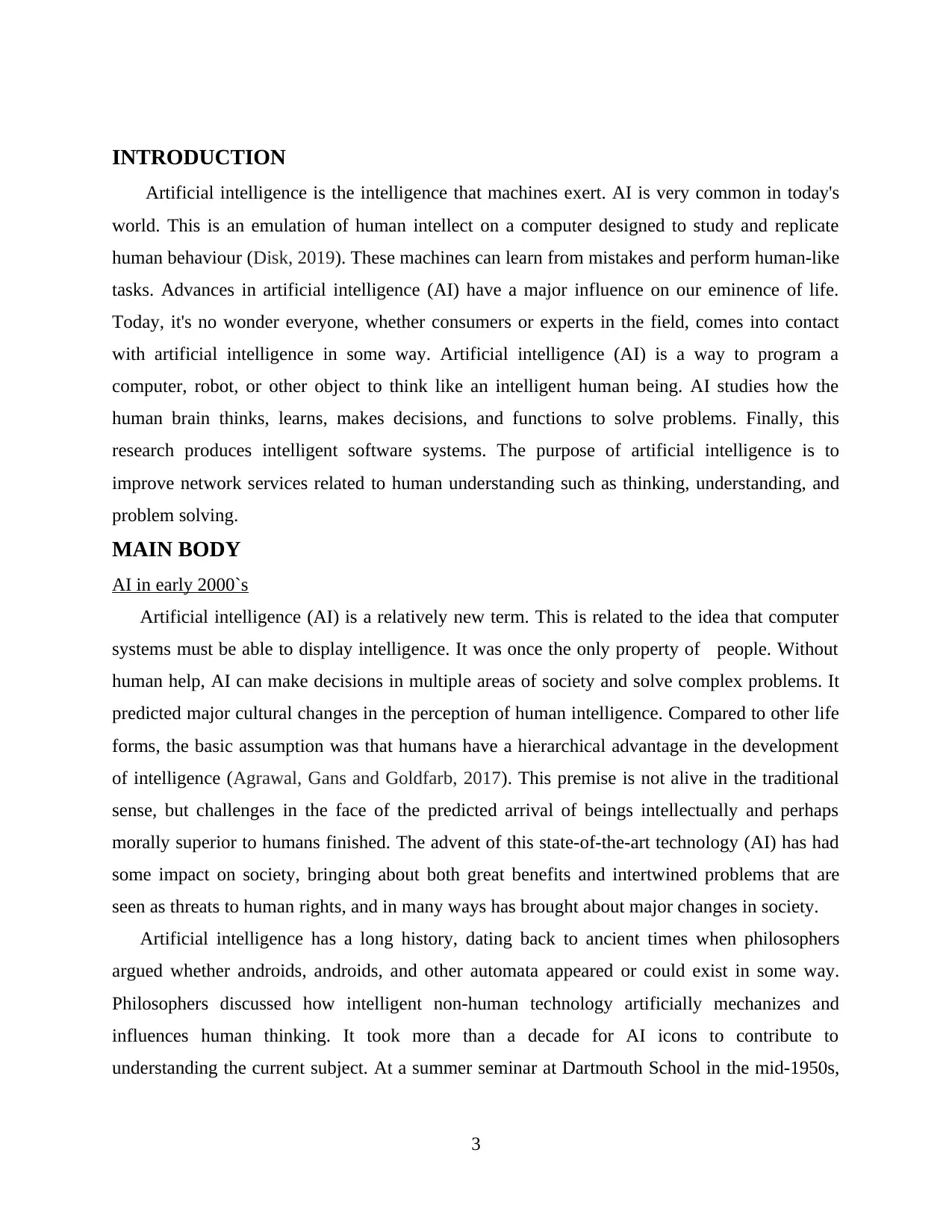
INTRODUCTION
Artificial intelligence is the intelligence that machines exert. AI is very common in today's
world. This is an emulation of human intellect on a computer designed to study and replicate
human behaviour (Disk, 2019). These machines can learn from mistakes and perform human-like
tasks. Advances in artificial intelligence (AI) have a major influence on our eminence of life.
Today, it's no wonder everyone, whether consumers or experts in the field, comes into contact
with artificial intelligence in some way. Artificial intelligence (AI) is a way to program a
computer, robot, or other object to think like an intelligent human being. AI studies how the
human brain thinks, learns, makes decisions, and functions to solve problems. Finally, this
research produces intelligent software systems. The purpose of artificial intelligence is to
improve network services related to human understanding such as thinking, understanding, and
problem solving.
MAIN BODY
AI in early 2000`s
Artificial intelligence (AI) is a relatively new term. This is related to the idea that computer
systems must be able to display intelligence. It was once the only property of people. Without
human help, AI can make decisions in multiple areas of society and solve complex problems. It
predicted major cultural changes in the perception of human intelligence. Compared to other life
forms, the basic assumption was that humans have a hierarchical advantage in the development
of intelligence (Agrawal, Gans and Goldfarb, 2017). This premise is not alive in the traditional
sense, but challenges in the face of the predicted arrival of beings intellectually and perhaps
morally superior to humans finished. The advent of this state-of-the-art technology (AI) has had
some impact on society, bringing about both great benefits and intertwined problems that are
seen as threats to human rights, and in many ways has brought about major changes in society.
Artificial intelligence has a long history, dating back to ancient times when philosophers
argued whether androids, androids, and other automata appeared or could exist in some way.
Philosophers discussed how intelligent non-human technology artificially mechanizes and
influences human thinking. It took more than a decade for AI icons to contribute to
understanding the current subject. At a summer seminar at Dartmouth School in the mid-1950s,
3
Artificial intelligence is the intelligence that machines exert. AI is very common in today's
world. This is an emulation of human intellect on a computer designed to study and replicate
human behaviour (Disk, 2019). These machines can learn from mistakes and perform human-like
tasks. Advances in artificial intelligence (AI) have a major influence on our eminence of life.
Today, it's no wonder everyone, whether consumers or experts in the field, comes into contact
with artificial intelligence in some way. Artificial intelligence (AI) is a way to program a
computer, robot, or other object to think like an intelligent human being. AI studies how the
human brain thinks, learns, makes decisions, and functions to solve problems. Finally, this
research produces intelligent software systems. The purpose of artificial intelligence is to
improve network services related to human understanding such as thinking, understanding, and
problem solving.
MAIN BODY
AI in early 2000`s
Artificial intelligence (AI) is a relatively new term. This is related to the idea that computer
systems must be able to display intelligence. It was once the only property of people. Without
human help, AI can make decisions in multiple areas of society and solve complex problems. It
predicted major cultural changes in the perception of human intelligence. Compared to other life
forms, the basic assumption was that humans have a hierarchical advantage in the development
of intelligence (Agrawal, Gans and Goldfarb, 2017). This premise is not alive in the traditional
sense, but challenges in the face of the predicted arrival of beings intellectually and perhaps
morally superior to humans finished. The advent of this state-of-the-art technology (AI) has had
some impact on society, bringing about both great benefits and intertwined problems that are
seen as threats to human rights, and in many ways has brought about major changes in society.
Artificial intelligence has a long history, dating back to ancient times when philosophers
argued whether androids, androids, and other automata appeared or could exist in some way.
Philosophers discussed how intelligent non-human technology artificially mechanizes and
influences human thinking. It took more than a decade for AI icons to contribute to
understanding the current subject. At a summer seminar at Dartmouth School in the mid-1950s,
3
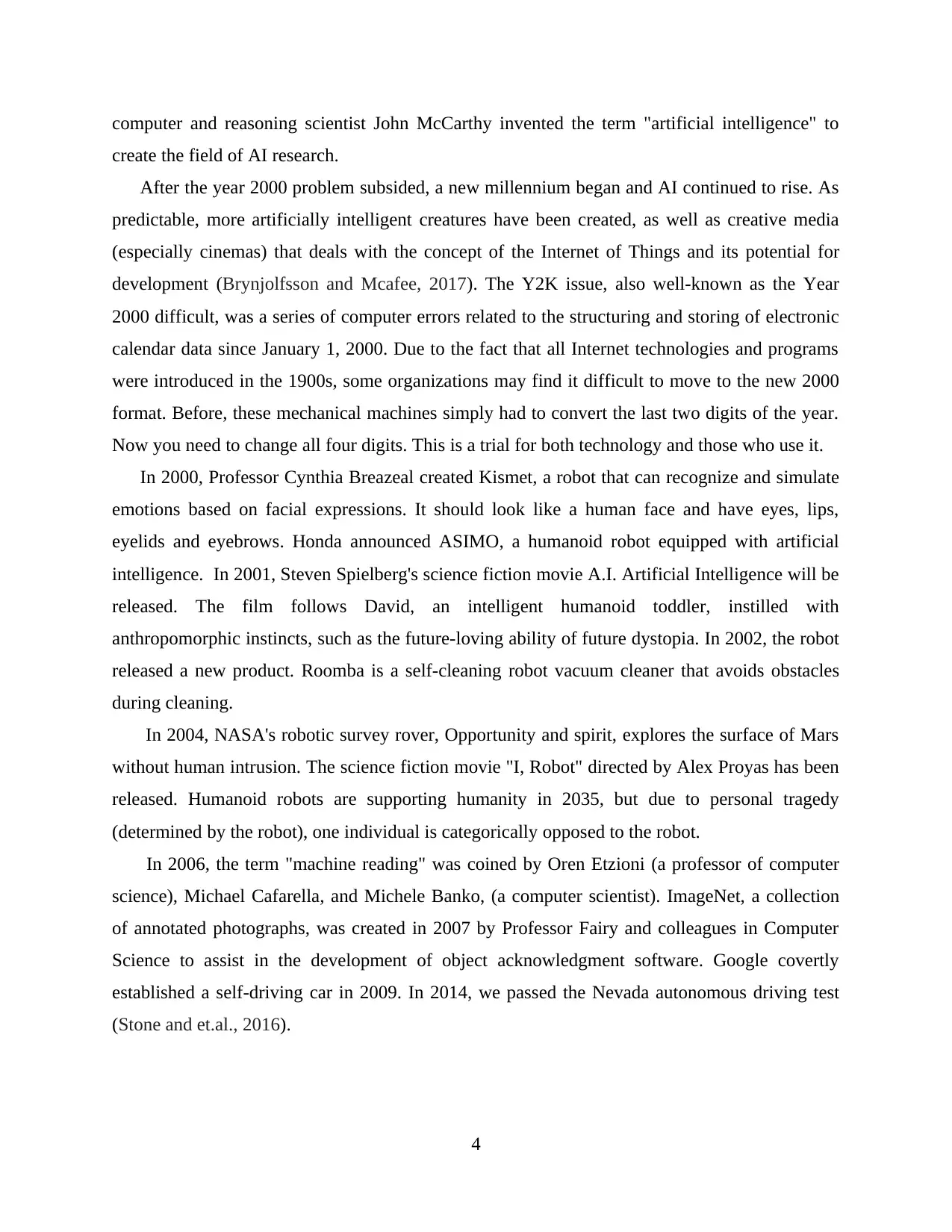
computer and reasoning scientist John McCarthy invented the term "artificial intelligence" to
create the field of AI research.
After the year 2000 problem subsided, a new millennium began and AI continued to rise. As
predictable, more artificially intelligent creatures have been created, as well as creative media
(especially cinemas) that deals with the concept of the Internet of Things and its potential for
development (Brynjolfsson and Mcafee, 2017). The Y2K issue, also well-known as the Year
2000 difficult, was a series of computer errors related to the structuring and storing of electronic
calendar data since January 1, 2000. Due to the fact that all Internet technologies and programs
were introduced in the 1900s, some organizations may find it difficult to move to the new 2000
format. Before, these mechanical machines simply had to convert the last two digits of the year.
Now you need to change all four digits. This is a trial for both technology and those who use it.
In 2000, Professor Cynthia Breazeal created Kismet, a robot that can recognize and simulate
emotions based on facial expressions. It should look like a human face and have eyes, lips,
eyelids and eyebrows. Honda announced ASIMO, a humanoid robot equipped with artificial
intelligence. In 2001, Steven Spielberg's science fiction movie A.I. Artificial Intelligence will be
released. The film follows David, an intelligent humanoid toddler, instilled with
anthropomorphic instincts, such as the future-loving ability of future dystopia. In 2002, the robot
released a new product. Roomba is a self-cleaning robot vacuum cleaner that avoids obstacles
during cleaning.
In 2004, NASA's robotic survey rover, Opportunity and spirit, explores the surface of Mars
without human intrusion. The science fiction movie "I, Robot" directed by Alex Proyas has been
released. Humanoid robots are supporting humanity in 2035, but due to personal tragedy
(determined by the robot), one individual is categorically opposed to the robot.
In 2006, the term "machine reading" was coined by Oren Etzioni (a professor of computer
science), Michael Cafarella, and Michele Banko, (a computer scientist). ImageNet, a collection
of annotated photographs, was created in 2007 by Professor Fairy and colleagues in Computer
Science to assist in the development of object acknowledgment software. Google covertly
established a self-driving car in 2009. In 2014, we passed the Nevada autonomous driving test
(Stone and et.al., 2016).
4
create the field of AI research.
After the year 2000 problem subsided, a new millennium began and AI continued to rise. As
predictable, more artificially intelligent creatures have been created, as well as creative media
(especially cinemas) that deals with the concept of the Internet of Things and its potential for
development (Brynjolfsson and Mcafee, 2017). The Y2K issue, also well-known as the Year
2000 difficult, was a series of computer errors related to the structuring and storing of electronic
calendar data since January 1, 2000. Due to the fact that all Internet technologies and programs
were introduced in the 1900s, some organizations may find it difficult to move to the new 2000
format. Before, these mechanical machines simply had to convert the last two digits of the year.
Now you need to change all four digits. This is a trial for both technology and those who use it.
In 2000, Professor Cynthia Breazeal created Kismet, a robot that can recognize and simulate
emotions based on facial expressions. It should look like a human face and have eyes, lips,
eyelids and eyebrows. Honda announced ASIMO, a humanoid robot equipped with artificial
intelligence. In 2001, Steven Spielberg's science fiction movie A.I. Artificial Intelligence will be
released. The film follows David, an intelligent humanoid toddler, instilled with
anthropomorphic instincts, such as the future-loving ability of future dystopia. In 2002, the robot
released a new product. Roomba is a self-cleaning robot vacuum cleaner that avoids obstacles
during cleaning.
In 2004, NASA's robotic survey rover, Opportunity and spirit, explores the surface of Mars
without human intrusion. The science fiction movie "I, Robot" directed by Alex Proyas has been
released. Humanoid robots are supporting humanity in 2035, but due to personal tragedy
(determined by the robot), one individual is categorically opposed to the robot.
In 2006, the term "machine reading" was coined by Oren Etzioni (a professor of computer
science), Michael Cafarella, and Michele Banko, (a computer scientist). ImageNet, a collection
of annotated photographs, was created in 2007 by Professor Fairy and colleagues in Computer
Science to assist in the development of object acknowledgment software. Google covertly
established a self-driving car in 2009. In 2014, we passed the Nevada autonomous driving test
(Stone and et.al., 2016).
4
Secure Best Marks with AI Grader
Need help grading? Try our AI Grader for instant feedback on your assignments.
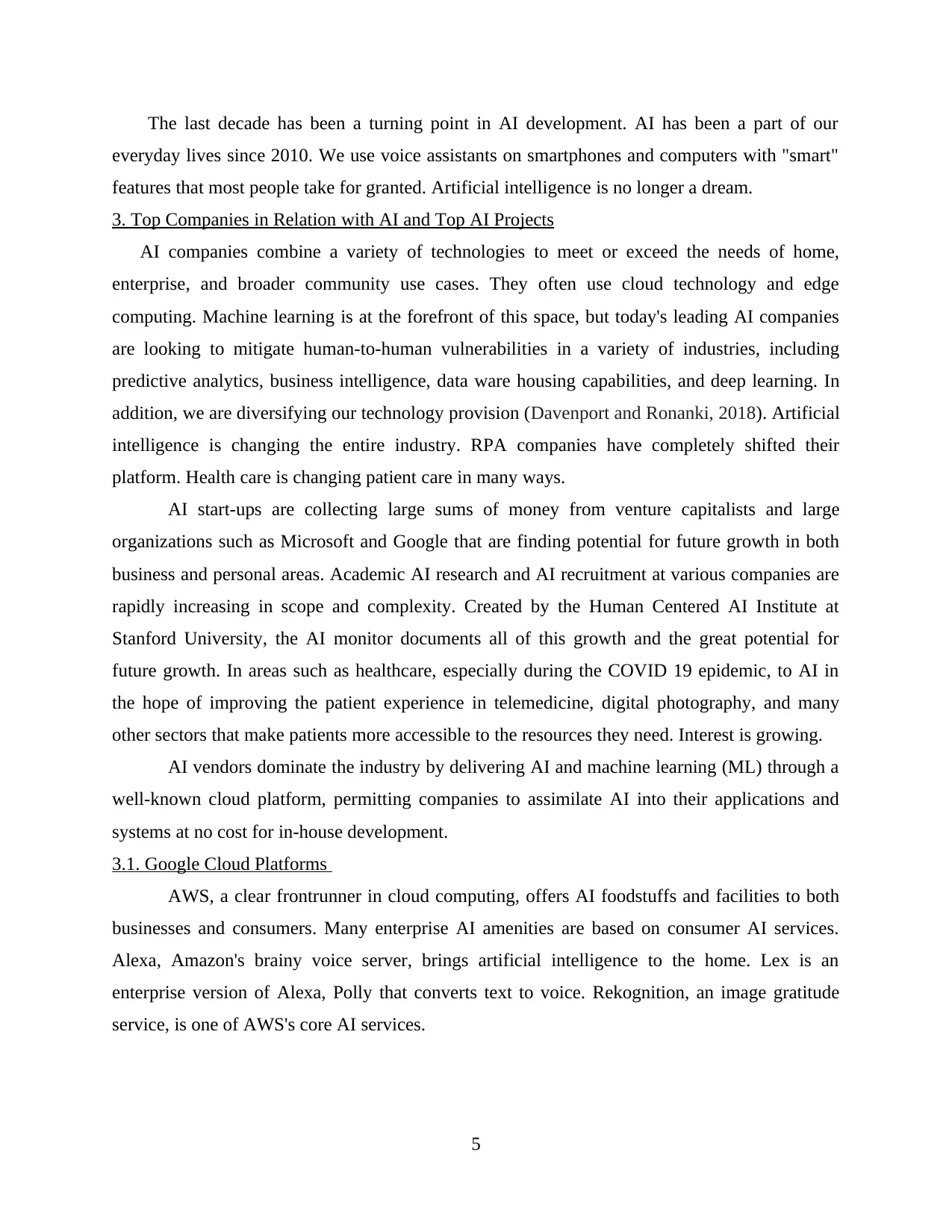
The last decade has been a turning point in AI development. AI has been a part of our
everyday lives since 2010. We use voice assistants on smartphones and computers with "smart"
features that most people take for granted. Artificial intelligence is no longer a dream.
3. Top Companies in Relation with AI and Top AI Projects
AI companies combine a variety of technologies to meet or exceed the needs of home,
enterprise, and broader community use cases. They often use cloud technology and edge
computing. Machine learning is at the forefront of this space, but today's leading AI companies
are looking to mitigate human-to-human vulnerabilities in a variety of industries, including
predictive analytics, business intelligence, data ware housing capabilities, and deep learning. In
addition, we are diversifying our technology provision (Davenport and Ronanki, 2018). Artificial
intelligence is changing the entire industry. RPA companies have completely shifted their
platform. Health care is changing patient care in many ways.
AI start-ups are collecting large sums of money from venture capitalists and large
organizations such as Microsoft and Google that are finding potential for future growth in both
business and personal areas. Academic AI research and AI recruitment at various companies are
rapidly increasing in scope and complexity. Created by the Human Centered AI Institute at
Stanford University, the AI monitor documents all of this growth and the great potential for
future growth. In areas such as healthcare, especially during the COVID 19 epidemic, to AI in
the hope of improving the patient experience in telemedicine, digital photography, and many
other sectors that make patients more accessible to the resources they need. Interest is growing.
AI vendors dominate the industry by delivering AI and machine learning (ML) through a
well-known cloud platform, permitting companies to assimilate AI into their applications and
systems at no cost for in-house development.
3.1. Google Cloud Platforms
AWS, a clear frontrunner in cloud computing, offers AI foodstuffs and facilities to both
businesses and consumers. Many enterprise AI amenities are based on consumer AI services.
Alexa, Amazon's brainy voice server, brings artificial intelligence to the home. Lex is an
enterprise version of Alexa, Polly that converts text to voice. Rekognition, an image gratitude
service, is one of AWS's core AI services.
5
everyday lives since 2010. We use voice assistants on smartphones and computers with "smart"
features that most people take for granted. Artificial intelligence is no longer a dream.
3. Top Companies in Relation with AI and Top AI Projects
AI companies combine a variety of technologies to meet or exceed the needs of home,
enterprise, and broader community use cases. They often use cloud technology and edge
computing. Machine learning is at the forefront of this space, but today's leading AI companies
are looking to mitigate human-to-human vulnerabilities in a variety of industries, including
predictive analytics, business intelligence, data ware housing capabilities, and deep learning. In
addition, we are diversifying our technology provision (Davenport and Ronanki, 2018). Artificial
intelligence is changing the entire industry. RPA companies have completely shifted their
platform. Health care is changing patient care in many ways.
AI start-ups are collecting large sums of money from venture capitalists and large
organizations such as Microsoft and Google that are finding potential for future growth in both
business and personal areas. Academic AI research and AI recruitment at various companies are
rapidly increasing in scope and complexity. Created by the Human Centered AI Institute at
Stanford University, the AI monitor documents all of this growth and the great potential for
future growth. In areas such as healthcare, especially during the COVID 19 epidemic, to AI in
the hope of improving the patient experience in telemedicine, digital photography, and many
other sectors that make patients more accessible to the resources they need. Interest is growing.
AI vendors dominate the industry by delivering AI and machine learning (ML) through a
well-known cloud platform, permitting companies to assimilate AI into their applications and
systems at no cost for in-house development.
3.1. Google Cloud Platforms
AWS, a clear frontrunner in cloud computing, offers AI foodstuffs and facilities to both
businesses and consumers. Many enterprise AI amenities are based on consumer AI services.
Alexa, Amazon's brainy voice server, brings artificial intelligence to the home. Lex is an
enterprise version of Alexa, Polly that converts text to voice. Rekognition, an image gratitude
service, is one of AWS's core AI services.
5
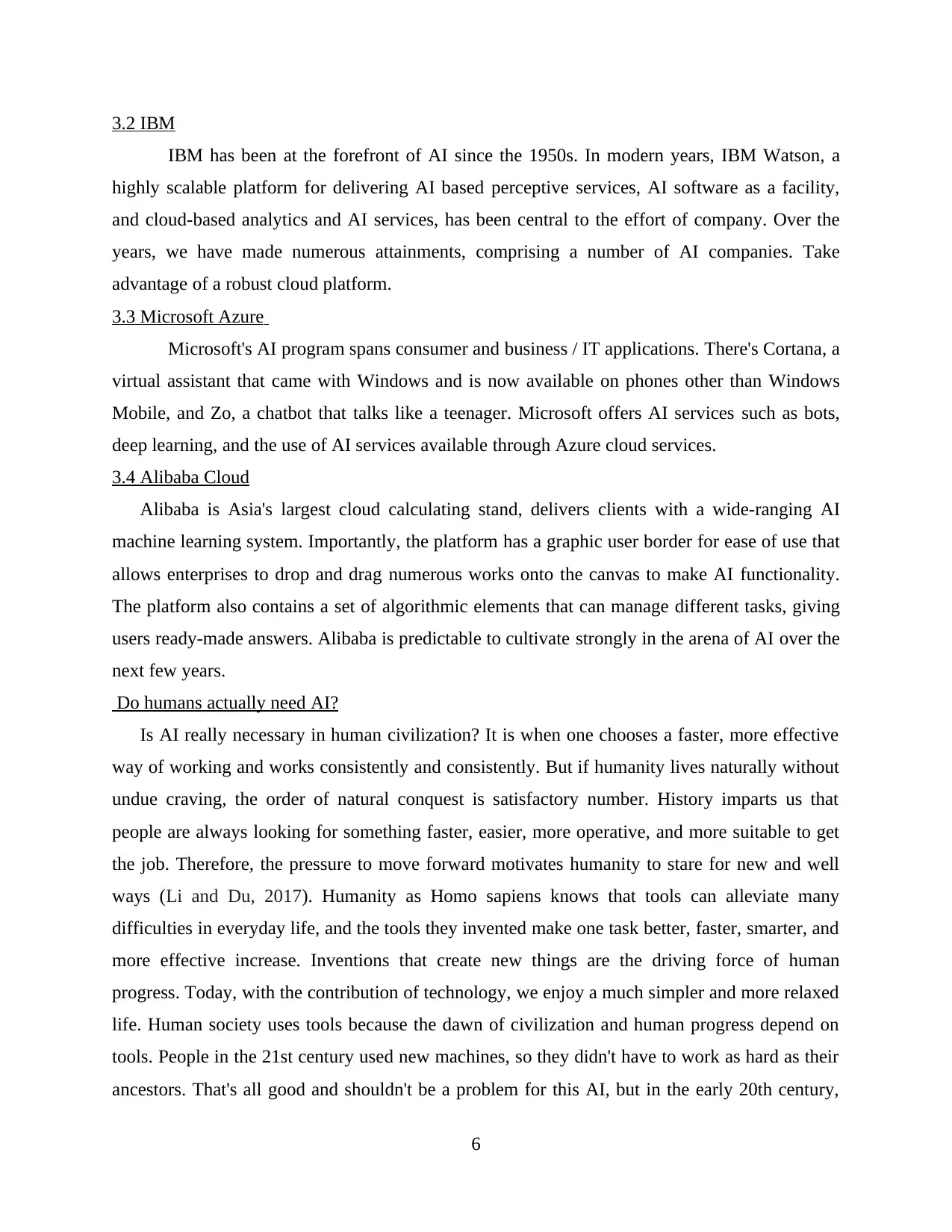
3.2 IBM
IBM has been at the forefront of AI since the 1950s. In modern years, IBM Watson, a
highly scalable platform for delivering AI based perceptive services, AI software as a facility,
and cloud-based analytics and AI services, has been central to the effort of company. Over the
years, we have made numerous attainments, comprising a number of AI companies. Take
advantage of a robust cloud platform.
3.3 Microsoft Azure
Microsoft's AI program spans consumer and business / IT applications. There's Cortana, a
virtual assistant that came with Windows and is now available on phones other than Windows
Mobile, and Zo, a chatbot that talks like a teenager. Microsoft offers AI services such as bots,
deep learning, and the use of AI services available through Azure cloud services.
3.4 Alibaba Cloud
Alibaba is Asia's largest cloud calculating stand, delivers clients with a wide-ranging AI
machine learning system. Importantly, the platform has a graphic user border for ease of use that
allows enterprises to drop and drag numerous works onto the canvas to make AI functionality.
The platform also contains a set of algorithmic elements that can manage different tasks, giving
users ready-made answers. Alibaba is predictable to cultivate strongly in the arena of AI over the
next few years.
Do humans actually need AI?
Is AI really necessary in human civilization? It is when one chooses a faster, more effective
way of working and works consistently and consistently. But if humanity lives naturally without
undue craving, the order of natural conquest is satisfactory number. History imparts us that
people are always looking for something faster, easier, more operative, and more suitable to get
the job. Therefore, the pressure to move forward motivates humanity to stare for new and well
ways (Li and Du, 2017). Humanity as Homo sapiens knows that tools can alleviate many
difficulties in everyday life, and the tools they invented make one task better, faster, smarter, and
more effective increase. Inventions that create new things are the driving force of human
progress. Today, with the contribution of technology, we enjoy a much simpler and more relaxed
life. Human society uses tools because the dawn of civilization and human progress depend on
tools. People in the 21st century used new machines, so they didn't have to work as hard as their
ancestors. That's all good and shouldn't be a problem for this AI, but in the early 20th century,
6
IBM has been at the forefront of AI since the 1950s. In modern years, IBM Watson, a
highly scalable platform for delivering AI based perceptive services, AI software as a facility,
and cloud-based analytics and AI services, has been central to the effort of company. Over the
years, we have made numerous attainments, comprising a number of AI companies. Take
advantage of a robust cloud platform.
3.3 Microsoft Azure
Microsoft's AI program spans consumer and business / IT applications. There's Cortana, a
virtual assistant that came with Windows and is now available on phones other than Windows
Mobile, and Zo, a chatbot that talks like a teenager. Microsoft offers AI services such as bots,
deep learning, and the use of AI services available through Azure cloud services.
3.4 Alibaba Cloud
Alibaba is Asia's largest cloud calculating stand, delivers clients with a wide-ranging AI
machine learning system. Importantly, the platform has a graphic user border for ease of use that
allows enterprises to drop and drag numerous works onto the canvas to make AI functionality.
The platform also contains a set of algorithmic elements that can manage different tasks, giving
users ready-made answers. Alibaba is predictable to cultivate strongly in the arena of AI over the
next few years.
Do humans actually need AI?
Is AI really necessary in human civilization? It is when one chooses a faster, more effective
way of working and works consistently and consistently. But if humanity lives naturally without
undue craving, the order of natural conquest is satisfactory number. History imparts us that
people are always looking for something faster, easier, more operative, and more suitable to get
the job. Therefore, the pressure to move forward motivates humanity to stare for new and well
ways (Li and Du, 2017). Humanity as Homo sapiens knows that tools can alleviate many
difficulties in everyday life, and the tools they invented make one task better, faster, smarter, and
more effective increase. Inventions that create new things are the driving force of human
progress. Today, with the contribution of technology, we enjoy a much simpler and more relaxed
life. Human society uses tools because the dawn of civilization and human progress depend on
tools. People in the 21st century used new machines, so they didn't have to work as hard as their
ancestors. That's all good and shouldn't be a problem for this AI, but in the early 20th century,
6
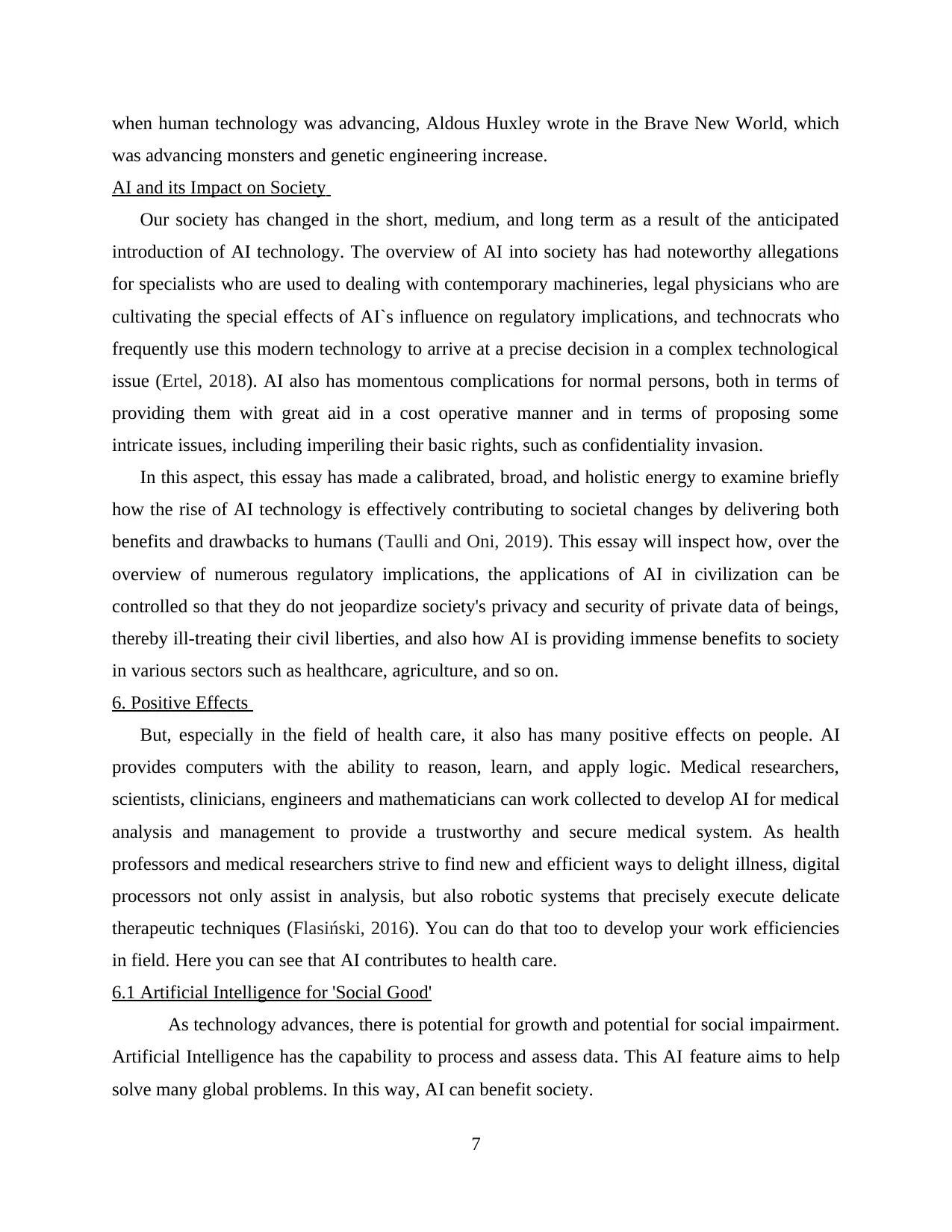
when human technology was advancing, Aldous Huxley wrote in the Brave New World, which
was advancing monsters and genetic engineering increase.
AI and its Impact on Society
Our society has changed in the short, medium, and long term as a result of the anticipated
introduction of AI technology. The overview of AI into society has had noteworthy allegations
for specialists who are used to dealing with contemporary machineries, legal physicians who are
cultivating the special effects of AI`s influence on regulatory implications, and technocrats who
frequently use this modern technology to arrive at a precise decision in a complex technological
issue (Ertel, 2018). AI also has momentous complications for normal persons, both in terms of
providing them with great aid in a cost operative manner and in terms of proposing some
intricate issues, including imperiling their basic rights, such as confidentiality invasion.
In this aspect, this essay has made a calibrated, broad, and holistic energy to examine briefly
how the rise of AI technology is effectively contributing to societal changes by delivering both
benefits and drawbacks to humans (Taulli and Oni, 2019). This essay will inspect how, over the
overview of numerous regulatory implications, the applications of AI in civilization can be
controlled so that they do not jeopardize society's privacy and security of private data of beings,
thereby ill-treating their civil liberties, and also how AI is providing immense benefits to society
in various sectors such as healthcare, agriculture, and so on.
6. Positive Effects
But, especially in the field of health care, it also has many positive effects on people. AI
provides computers with the ability to reason, learn, and apply logic. Medical researchers,
scientists, clinicians, engineers and mathematicians can work collected to develop AI for medical
analysis and management to provide a trustworthy and secure medical system. As health
professors and medical researchers strive to find new and efficient ways to delight illness, digital
processors not only assist in analysis, but also robotic systems that precisely execute delicate
therapeutic techniques (Flasiński, 2016). You can do that too to develop your work efficiencies
in field. Here you can see that AI contributes to health care.
6.1 Artificial Intelligence for 'Social Good'
As technology advances, there is potential for growth and potential for social impairment.
Artificial Intelligence has the capability to process and assess data. This AI feature aims to help
solve many global problems. In this way, AI can benefit society.
7
was advancing monsters and genetic engineering increase.
AI and its Impact on Society
Our society has changed in the short, medium, and long term as a result of the anticipated
introduction of AI technology. The overview of AI into society has had noteworthy allegations
for specialists who are used to dealing with contemporary machineries, legal physicians who are
cultivating the special effects of AI`s influence on regulatory implications, and technocrats who
frequently use this modern technology to arrive at a precise decision in a complex technological
issue (Ertel, 2018). AI also has momentous complications for normal persons, both in terms of
providing them with great aid in a cost operative manner and in terms of proposing some
intricate issues, including imperiling their basic rights, such as confidentiality invasion.
In this aspect, this essay has made a calibrated, broad, and holistic energy to examine briefly
how the rise of AI technology is effectively contributing to societal changes by delivering both
benefits and drawbacks to humans (Taulli and Oni, 2019). This essay will inspect how, over the
overview of numerous regulatory implications, the applications of AI in civilization can be
controlled so that they do not jeopardize society's privacy and security of private data of beings,
thereby ill-treating their civil liberties, and also how AI is providing immense benefits to society
in various sectors such as healthcare, agriculture, and so on.
6. Positive Effects
But, especially in the field of health care, it also has many positive effects on people. AI
provides computers with the ability to reason, learn, and apply logic. Medical researchers,
scientists, clinicians, engineers and mathematicians can work collected to develop AI for medical
analysis and management to provide a trustworthy and secure medical system. As health
professors and medical researchers strive to find new and efficient ways to delight illness, digital
processors not only assist in analysis, but also robotic systems that precisely execute delicate
therapeutic techniques (Flasiński, 2016). You can do that too to develop your work efficiencies
in field. Here you can see that AI contributes to health care.
6.1 Artificial Intelligence for 'Social Good'
As technology advances, there is potential for growth and potential for social impairment.
Artificial Intelligence has the capability to process and assess data. This AI feature aims to help
solve many global problems. In this way, AI can benefit society.
7
Paraphrase This Document
Need a fresh take? Get an instant paraphrase of this document with our AI Paraphraser
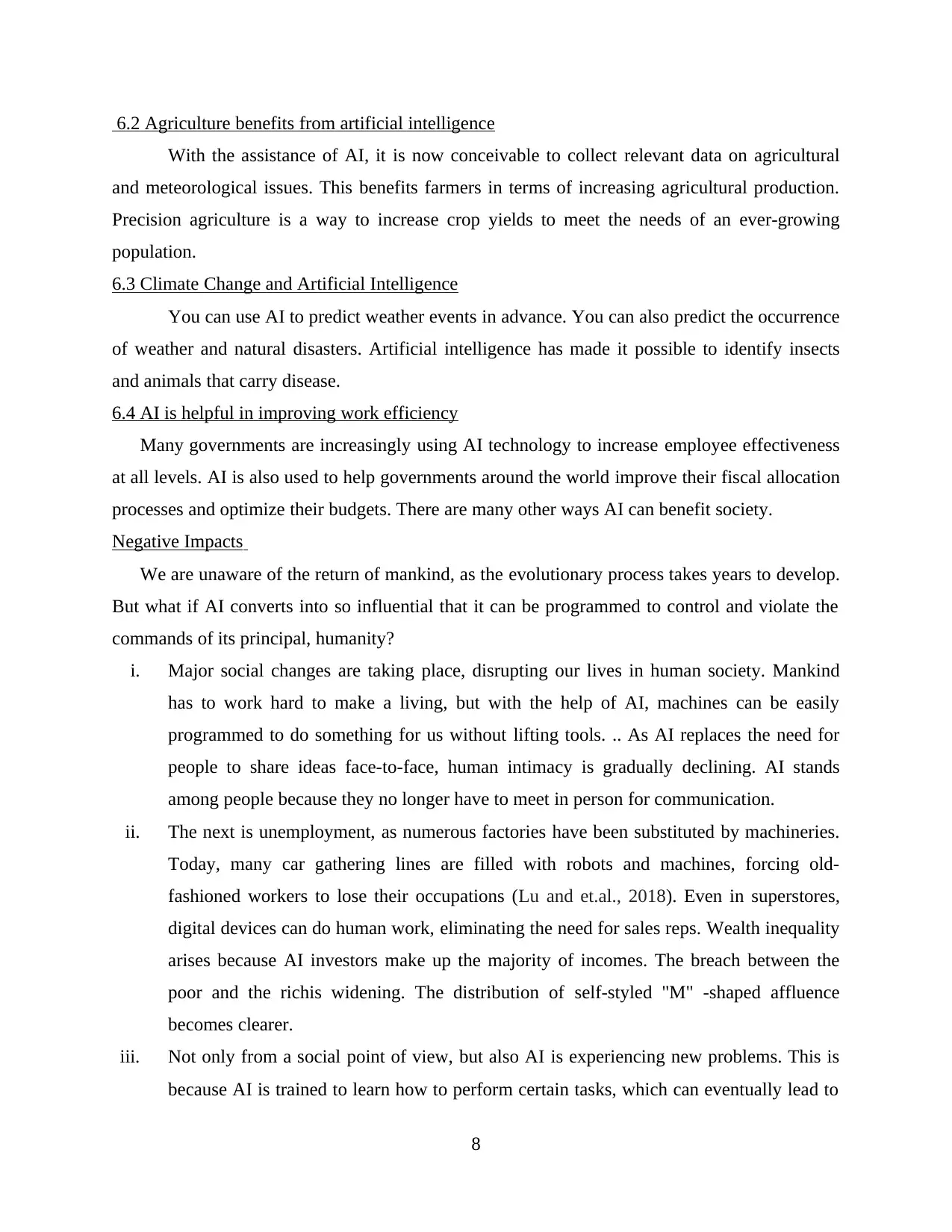
6.2 Agriculture benefits from artificial intelligence
With the assistance of AI, it is now conceivable to collect relevant data on agricultural
and meteorological issues. This benefits farmers in terms of increasing agricultural production.
Precision agriculture is a way to increase crop yields to meet the needs of an ever-growing
population.
6.3 Climate Change and Artificial Intelligence
You can use AI to predict weather events in advance. You can also predict the occurrence
of weather and natural disasters. Artificial intelligence has made it possible to identify insects
and animals that carry disease.
6.4 AI is helpful in improving work efficiency
Many governments are increasingly using AI technology to increase employee effectiveness
at all levels. AI is also used to help governments around the world improve their fiscal allocation
processes and optimize their budgets. There are many other ways AI can benefit society.
Negative Impacts
We are unaware of the return of mankind, as the evolutionary process takes years to develop.
But what if AI converts into so influential that it can be programmed to control and violate the
commands of its principal, humanity?
i. Major social changes are taking place, disrupting our lives in human society. Mankind
has to work hard to make a living, but with the help of AI, machines can be easily
programmed to do something for us without lifting tools. .. As AI replaces the need for
people to share ideas face-to-face, human intimacy is gradually declining. AI stands
among people because they no longer have to meet in person for communication.
ii. The next is unemployment, as numerous factories have been substituted by machineries.
Today, many car gathering lines are filled with robots and machines, forcing old-
fashioned workers to lose their occupations (Lu and et.al., 2018). Even in superstores,
digital devices can do human work, eliminating the need for sales reps. Wealth inequality
arises because AI investors make up the majority of incomes. The breach between the
poor and the richis widening. The distribution of self-styled "M" -shaped affluence
becomes clearer.
iii. Not only from a social point of view, but also AI is experiencing new problems. This is
because AI is trained to learn how to perform certain tasks, which can eventually lead to
8
With the assistance of AI, it is now conceivable to collect relevant data on agricultural
and meteorological issues. This benefits farmers in terms of increasing agricultural production.
Precision agriculture is a way to increase crop yields to meet the needs of an ever-growing
population.
6.3 Climate Change and Artificial Intelligence
You can use AI to predict weather events in advance. You can also predict the occurrence
of weather and natural disasters. Artificial intelligence has made it possible to identify insects
and animals that carry disease.
6.4 AI is helpful in improving work efficiency
Many governments are increasingly using AI technology to increase employee effectiveness
at all levels. AI is also used to help governments around the world improve their fiscal allocation
processes and optimize their budgets. There are many other ways AI can benefit society.
Negative Impacts
We are unaware of the return of mankind, as the evolutionary process takes years to develop.
But what if AI converts into so influential that it can be programmed to control and violate the
commands of its principal, humanity?
i. Major social changes are taking place, disrupting our lives in human society. Mankind
has to work hard to make a living, but with the help of AI, machines can be easily
programmed to do something for us without lifting tools. .. As AI replaces the need for
people to share ideas face-to-face, human intimacy is gradually declining. AI stands
among people because they no longer have to meet in person for communication.
ii. The next is unemployment, as numerous factories have been substituted by machineries.
Today, many car gathering lines are filled with robots and machines, forcing old-
fashioned workers to lose their occupations (Lu and et.al., 2018). Even in superstores,
digital devices can do human work, eliminating the need for sales reps. Wealth inequality
arises because AI investors make up the majority of incomes. The breach between the
poor and the richis widening. The distribution of self-styled "M" -shaped affluence
becomes clearer.
iii. Not only from a social point of view, but also AI is experiencing new problems. This is
because AI is trained to learn how to perform certain tasks, which can eventually lead to
8
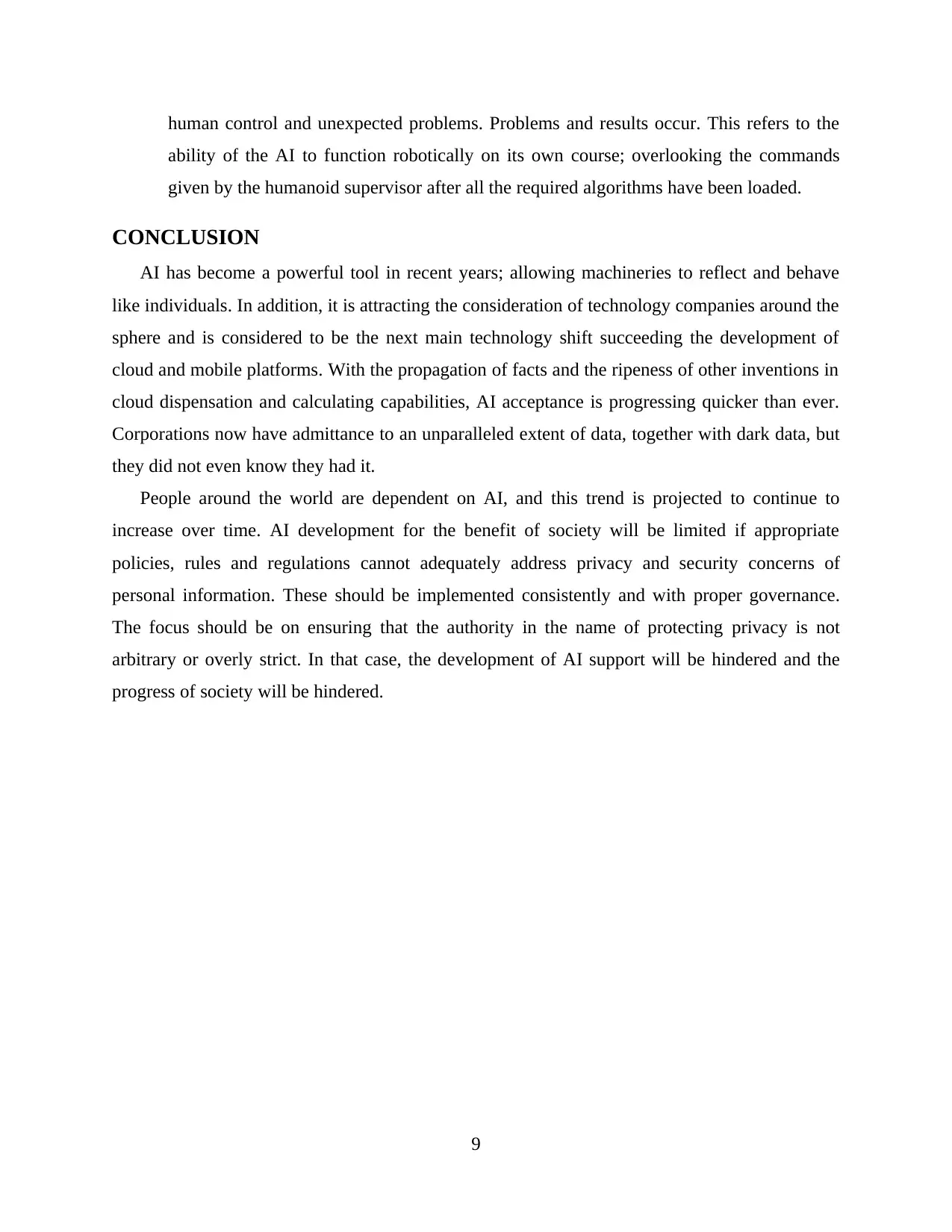
human control and unexpected problems. Problems and results occur. This refers to the
ability of the AI to function robotically on its own course; overlooking the commands
given by the humanoid supervisor after all the required algorithms have been loaded.
CONCLUSION
AI has become a powerful tool in recent years; allowing machineries to reflect and behave
like individuals. In addition, it is attracting the consideration of technology companies around the
sphere and is considered to be the next main technology shift succeeding the development of
cloud and mobile platforms. With the propagation of facts and the ripeness of other inventions in
cloud dispensation and calculating capabilities, AI acceptance is progressing quicker than ever.
Corporations now have admittance to an unparalleled extent of data, together with dark data, but
they did not even know they had it.
People around the world are dependent on AI, and this trend is projected to continue to
increase over time. AI development for the benefit of society will be limited if appropriate
policies, rules and regulations cannot adequately address privacy and security concerns of
personal information. These should be implemented consistently and with proper governance.
The focus should be on ensuring that the authority in the name of protecting privacy is not
arbitrary or overly strict. In that case, the development of AI support will be hindered and the
progress of society will be hindered.
9
ability of the AI to function robotically on its own course; overlooking the commands
given by the humanoid supervisor after all the required algorithms have been loaded.
CONCLUSION
AI has become a powerful tool in recent years; allowing machineries to reflect and behave
like individuals. In addition, it is attracting the consideration of technology companies around the
sphere and is considered to be the next main technology shift succeeding the development of
cloud and mobile platforms. With the propagation of facts and the ripeness of other inventions in
cloud dispensation and calculating capabilities, AI acceptance is progressing quicker than ever.
Corporations now have admittance to an unparalleled extent of data, together with dark data, but
they did not even know they had it.
People around the world are dependent on AI, and this trend is projected to continue to
increase over time. AI development for the benefit of society will be limited if appropriate
policies, rules and regulations cannot adequately address privacy and security concerns of
personal information. These should be implemented consistently and with proper governance.
The focus should be on ensuring that the authority in the name of protecting privacy is not
arbitrary or overly strict. In that case, the development of AI support will be hindered and the
progress of society will be hindered.
9
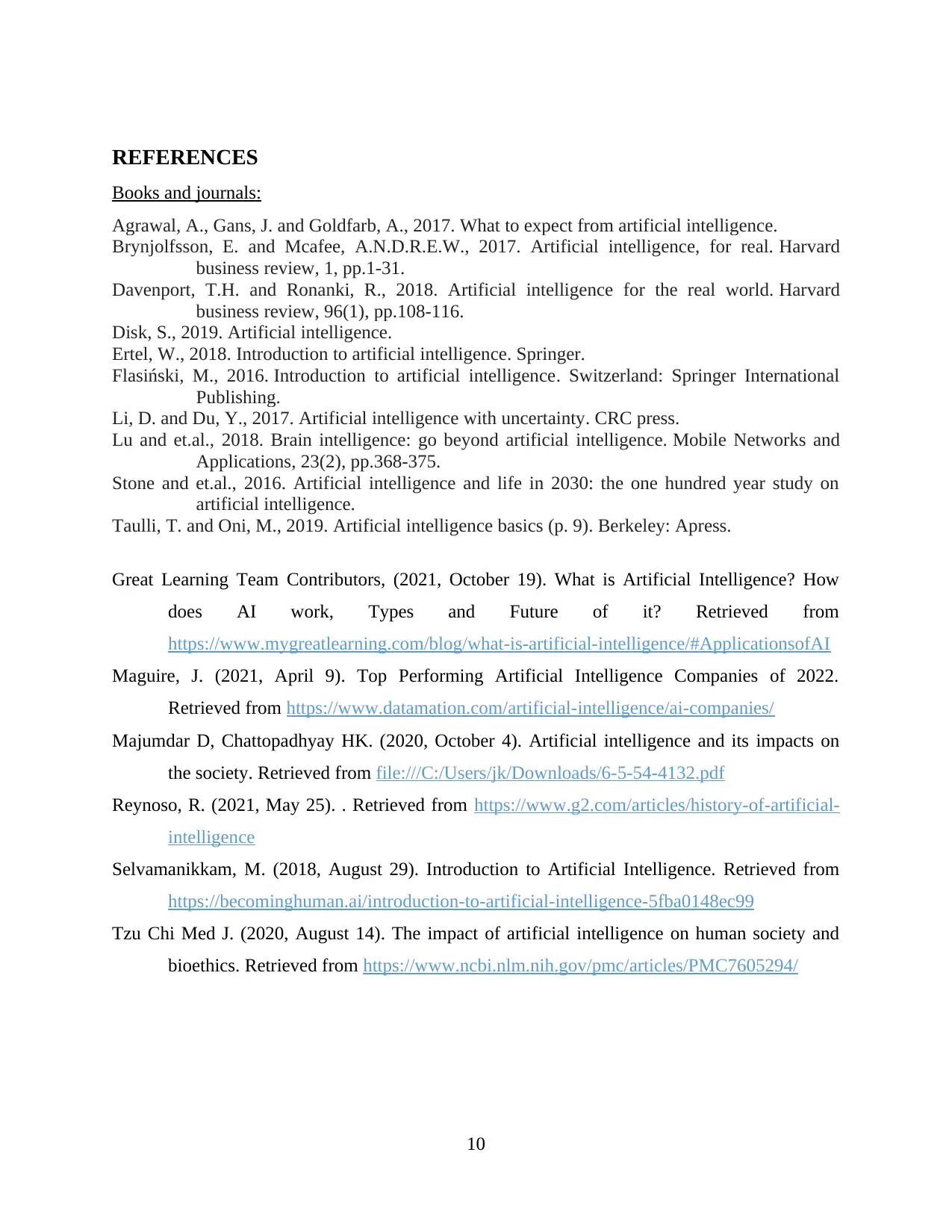
REFERENCES
Books and journals:
Agrawal, A., Gans, J. and Goldfarb, A., 2017. What to expect from artificial intelligence.
Brynjolfsson, E. and Mcafee, A.N.D.R.E.W., 2017. Artificial intelligence, for real. Harvard
business review, 1, pp.1-31.
Davenport, T.H. and Ronanki, R., 2018. Artificial intelligence for the real world. Harvard
business review, 96(1), pp.108-116.
Disk, S., 2019. Artificial intelligence.
Ertel, W., 2018. Introduction to artificial intelligence. Springer.
Flasiński, M., 2016. Introduction to artificial intelligence. Switzerland: Springer International
Publishing.
Li, D. and Du, Y., 2017. Artificial intelligence with uncertainty. CRC press.
Lu and et.al., 2018. Brain intelligence: go beyond artificial intelligence. Mobile Networks and
Applications, 23(2), pp.368-375.
Stone and et.al., 2016. Artificial intelligence and life in 2030: the one hundred year study on
artificial intelligence.
Taulli, T. and Oni, M., 2019. Artificial intelligence basics (p. 9). Berkeley: Apress.
Great Learning Team Contributors, (2021, October 19). What is Artificial Intelligence? How
does AI work, Types and Future of it? Retrieved from
https://www.mygreatlearning.com/blog/what-is-artificial-intelligence/#ApplicationsofAI
Maguire, J. (2021, April 9). Top Performing Artificial Intelligence Companies of 2022.
Retrieved from https://www.datamation.com/artificial-intelligence/ai-companies/
Majumdar D, Chattopadhyay HK. (2020, October 4). Artificial intelligence and its impacts on
the society. Retrieved from file:///C:/Users/jk/Downloads/6-5-54-4132.pdf
Reynoso, R. (2021, May 25). . Retrieved from https://www.g2.com/articles/history-of-artificial-
intelligence
Selvamanikkam, M. (2018, August 29). Introduction to Artificial Intelligence. Retrieved from
https://becominghuman.ai/introduction-to-artificial-intelligence-5fba0148ec99
Tzu Chi Med J. (2020, August 14). The impact of artificial intelligence on human society and
bioethics. Retrieved from https://www.ncbi.nlm.nih.gov/pmc/articles/PMC7605294/
10
Books and journals:
Agrawal, A., Gans, J. and Goldfarb, A., 2017. What to expect from artificial intelligence.
Brynjolfsson, E. and Mcafee, A.N.D.R.E.W., 2017. Artificial intelligence, for real. Harvard
business review, 1, pp.1-31.
Davenport, T.H. and Ronanki, R., 2018. Artificial intelligence for the real world. Harvard
business review, 96(1), pp.108-116.
Disk, S., 2019. Artificial intelligence.
Ertel, W., 2018. Introduction to artificial intelligence. Springer.
Flasiński, M., 2016. Introduction to artificial intelligence. Switzerland: Springer International
Publishing.
Li, D. and Du, Y., 2017. Artificial intelligence with uncertainty. CRC press.
Lu and et.al., 2018. Brain intelligence: go beyond artificial intelligence. Mobile Networks and
Applications, 23(2), pp.368-375.
Stone and et.al., 2016. Artificial intelligence and life in 2030: the one hundred year study on
artificial intelligence.
Taulli, T. and Oni, M., 2019. Artificial intelligence basics (p. 9). Berkeley: Apress.
Great Learning Team Contributors, (2021, October 19). What is Artificial Intelligence? How
does AI work, Types and Future of it? Retrieved from
https://www.mygreatlearning.com/blog/what-is-artificial-intelligence/#ApplicationsofAI
Maguire, J. (2021, April 9). Top Performing Artificial Intelligence Companies of 2022.
Retrieved from https://www.datamation.com/artificial-intelligence/ai-companies/
Majumdar D, Chattopadhyay HK. (2020, October 4). Artificial intelligence and its impacts on
the society. Retrieved from file:///C:/Users/jk/Downloads/6-5-54-4132.pdf
Reynoso, R. (2021, May 25). . Retrieved from https://www.g2.com/articles/history-of-artificial-
intelligence
Selvamanikkam, M. (2018, August 29). Introduction to Artificial Intelligence. Retrieved from
https://becominghuman.ai/introduction-to-artificial-intelligence-5fba0148ec99
Tzu Chi Med J. (2020, August 14). The impact of artificial intelligence on human society and
bioethics. Retrieved from https://www.ncbi.nlm.nih.gov/pmc/articles/PMC7605294/
10
1 out of 10
Related Documents
Your All-in-One AI-Powered Toolkit for Academic Success.
+13062052269
info@desklib.com
Available 24*7 on WhatsApp / Email
![[object Object]](/_next/static/media/star-bottom.7253800d.svg)
Unlock your academic potential
© 2024 | Zucol Services PVT LTD | All rights reserved.





